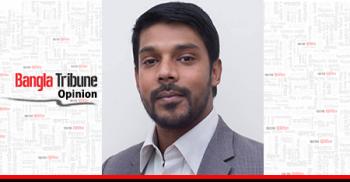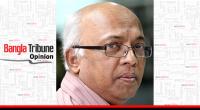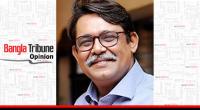 As young law students growing up in Bangladesh in the early 2000s and believing in a progressive ideology, we had few role models to look up to in the profession. Dr. Kamal Hossain was one of them.
As young law students growing up in Bangladesh in the early 2000s and believing in a progressive ideology, we had few role models to look up to in the profession. Dr. Kamal Hossain was one of them.
A noted jurist with national and international acclaim, a close associate of the Father of the Nation Bangabandhu Sheikh Mujibur Rahman, an architect of our Constitution, a lawyer who was seen to stand up for what’s right, he had all the qualities an impressionable young legal mind wanted to emulate.
But then came the infamous 1/11 and the era of de-politicisation by the military-installed caretaker administration. I witnessed in shock and horror as Dr. Kamal, like many others in our so-called civil society, rather than take a conscientious position to this unconstitutional and undemocratic rule, provided it legitimacy by speaking in its favour and against the political parties.
Yes, our politics needed reforms then, as it does now. It is a continuous process of change and improvement. But that will never be achieved sustainably at the barrel of a gun. And that is exactly what 1/11 was.
With the myth of perfection shattered, I learnt more and more about the politics of the lawyer I had come to admire for his professional qualities. In politics, as in law, he is known mostly as one of the framers of our Constitution. But so were 33 other members in that drafting committee. We do not know their names, however, because they have not been able to publicise that fact to their advantage as much.
In reality, Dr. Kamal’s historic association with the Father of the Nation has been his real achievement in politics. It was that association which enabled him to reach positions that he otherwise would probably never have reached and never has ever since August 1975. Not to say that once given those positions by Bangabandhu, he did not do justice to them.
But it must be stressed that it was only through contesting elections unopposed in Bangabandhu’s vacated seats in 1970 and 1973 that Kamal Hossain was able to sit in Parliament as a legislator.
It was only as a result of Bangabandhu including him in his successive Cabinets that Dr. Kamal was able to hold the portfolios of Law, Foreign and Petroleum Ministers.
Yet, when Bangabandhu was killed with almost his entire family on the fateful night of Aug 15 1975, the person who owed his entire political career to the Father of the Nation did not mount the expected international campaign against the killings, especially given Dr. Kamal’s international networks and connections.
Even Sheikh Hasina herself requested Dr. Kamal to lobby other countries not to recognise the killer regime of Khondaker Mostaq Ahmad after Aug 15, but he was not brave enough to oblige and returned to Oxford at that ultimate moment of national crisis.
The jurist’s electoral mettle was tested for real when he contested parliamentary elections in 1986, 1991 and 1996. He lost all three of the said elections, with substantial margins of defeat. It had set the tone of conversation in Bangladeshi politics that no matter how well-meaning Dr. Kamal maybe, he is not electoral material at the end of the day.
And that is where we should focus. Does Dr. Kamal really mean well? What does his record say? Is he really a conscientious electoral failure? Or has it been a case of his not getting the right opportunity?
Following his not so admirable role following the events of Aug 15 1975, Dr. Kamal was back in Awami League politics after Bangabandhu’s daughter Sheikh Hasina returned from exile in 1981 and took him along when she started rebuilding and reorganising Bangladesh Awami League.
For the next ten years, he would have a mixed relationship with the party and his leader, owing to his ambitions of leading the party. This is because before minus-two, there was minus-one, and Dr. Kamal was at the thick of it.
Following the 1991 elections, Kamal Hossain unsuccessfully made a bid to see Sheikh Hasina removed from the leadership of Awami League. Unfortunately, given the loyalty of the overwhelming number of party workers to Sheikh Hasina, it was he who had to leave the party instead. He then formed his own small party, the Gano Forum, which has till date never won a parliamentary seat.
Nowadays, Kamal Hossain talks a lot about restoring Bangladesh to ‘functional democracy’. Yet, he seems to be unaware of the concept of ‘internal democracy’, as he has been holding the position of the President of Gano Forum, the party he founded in 1992, since its inception, with no prospects of a new leadership in sight.
Recently this ‘conscientious politician’, as many like to portray him, has entered into a new political alliance ahead of the upcoming general elections in Bangladesh. But forming alliances is nothing new for Dr. Hossain though. He was in an alliance with the Awami League too between 2001 and 2006.
Yet, when the going got tough in 2007, he once again revealed his true nature. By supporting the activities of the military-installed caretaker administration and the regime’s minus-two formula of removing Sheikh Hasina and Khaleda Zia from politics, the constitutional expert showed that all his talk about constitutional government and democracy are but mere lip service to personal ends.
His current alliance with the Bangladesh Nationalist Party (BNP) comes at a time when the nation is still reeling from shock at the revelations of the Aug 21 grenade attack verdicts. It’s an alliance with a party which is headed by a fugitive, a convict under the law, responsible for, among other things, the cold-blooded design of the ‘obliteration’ of a political opposition with the help of a terrorist organisation and the state machinery and the use of military grade grenades.
It is especially disappointing, coming from Dr. Kamal Hossain because he did not have to wait for the verdict to know about the aim of this heinous attack. He led the five-member team of the then Supreme Court Bar Association which investigated the attack between August 2004 and February 2005 and their report concluded that the attack was a coordinated one perpetrated by trained professionals with the aim of assassinating Sheikh Hasina.
Yet today, around 14 years after publishing his own findings, Dr. Kamal has no trouble striking a deal with Tarique Rahman, the mastermind of that attack and the party that he leads. A party that is still in complete denial about its role in the Aug 21 mayhem and continues to wholeheartedly own convicted murderers such as Abdus Salam Pintu and Lutfozzaman Babar, the Vice-Chairman and Member of BNP’s Central Executive Committee respectively.
While not explicit, given that BNP is adamant about maintaining its relations with Jamaat-e- Islami, Dr. Kamal has also, therefore, entered into an alliance with the extremist and anti-liberation group. He had shown his weakness in this regard earlier too.
The International Crimes Tribunal (ICT-BD) was established by Bangladesh in 2010 for securing justice for the victims of genocide and crimes against humanity committed in 1971. Since its inception, Jamaat, to save its war criminal leaders has spent millions in a concerted international effort to malign and discredit this popular and worthy justice process. Dr. Kamal has never taken a strong stance in support of these trials.
In fact, one of the reasons why Dr. Kamal seems to have fallen out recently with his longtime allies, Dr. Badruddoza Chowdhury and others at Bikalpa Dhara seems to be the latter’s insistence on BNP cutting ties with Jamaat before joining any formal alliance with them.
His credentials as an advocate for human rights, as he and his followers often like to remind us, also sound hollow when we take into account that Dr. Hossain did not protest once while BNP-Jamaat carried out their fire-bombing campaign in the name of movement during the latter part of 2013 and early part of 2014, and repeated the same in 2015, resulting in the deaths of hundreds and injuring thousands through third degree burns.
Since Dr. Kamal regretted in his latest press conference how none seem to talk nowadays about how he loyally served Bangabandhu till the day of his death, I hope he knows that HuJi chief Mufti Hannan stated that during the planning meeting in Hawa Bhaban in the days leading up to the Aug 21 attack, Major Nur, the fugitive convicted killer of Bangabandhu was present there too.
But perhaps that would not affect him too much. Because for all his talk about loving Bangabandhu, Dr. Kamal seems to be quite alright these days being close associates with Barrister Mainul Hossein, a former adviser of the military-installed caretaker government, and more importantly a leader of the Democratic League, the party founded by the main conspirator of the Aug 15 tragedy, Khondaker Mostaq Ahmad in 1978.
Dr. Kamal has the right to join any political alliance. But he should at least be honest about his reasons for doing so. There is a deal somewhere in that alliance, there has to be. The people deserve to know that. If it is the allure of premiership that has convinced him to partner up with such forces as Tareque Rahman and the Jamaat-e-Islami, he should come out and say it publicly.
Because terms such as ‘democracy’ and ‘rule of law’ sound painfully hollow when one has a track record of supporting military-backed regimes and one’s allies have a track record of throwing grenades at opponents and lynching religious minorities.
Shah Ali Farhad is a lawyer, researcher and political activist. He is a senior analyst at the Centre for Research and Information (CRI).
 Opinion
Opinion
41360 hour(s) 6 minute(s) ago ;
Morning 03:01 ; Sunday ; Jul 06, 2025
The not so conscientious Dr. Kamal Hossain
Send
Shah Ali Farhad
Published : 18:21, Oct 15, 2018 | Updated : 19:16, Feb 06, 2019
Published : 18:21, Oct 15, 2018 | Updated : 19:16, Feb 06, 2019
0 ...0 ...
/ab/zmi/
Topics: Shah Ali Farhad
***The opinions, beliefs and viewpoints expressed in this article are those of the author and do not reflect the opinions and views of Bangla Tribune.
- KOICA donates medical supplies to BSMMU
- 5 more flights to take back British nationals to London
- Covid19: Rajarbagh, Mohammadpur worst affected
- Momen joins UN solidarity song over COVID-19 combat
- Covid-19: OIC to hold special meeting
- WFP begins food distribution in Cox’s Bazar
- WFP begins food distribution in Cox’s Bazar
- 290 return home to Australia
- Third charter flight for US citizens to return home
- Dhaka proposes to postpone D8 Summit
Unauthorized use of news, image, information, etc published by Bangla Tribune is punishable by copyright law. Appropriate legal steps will be taken by the management against any person or body that infringes those laws.
Bangla Tribune is one of the most revered online newspapers in Bangladesh, due to its reputation of neutral coverage and incisive analysis.
F R Tower, 8/C Panthapath, Shukrabad, Dhaka-1207 | Phone: 58151324; 58151326, Fax: 58151329 | Mob: 01730794527, 01730794528


